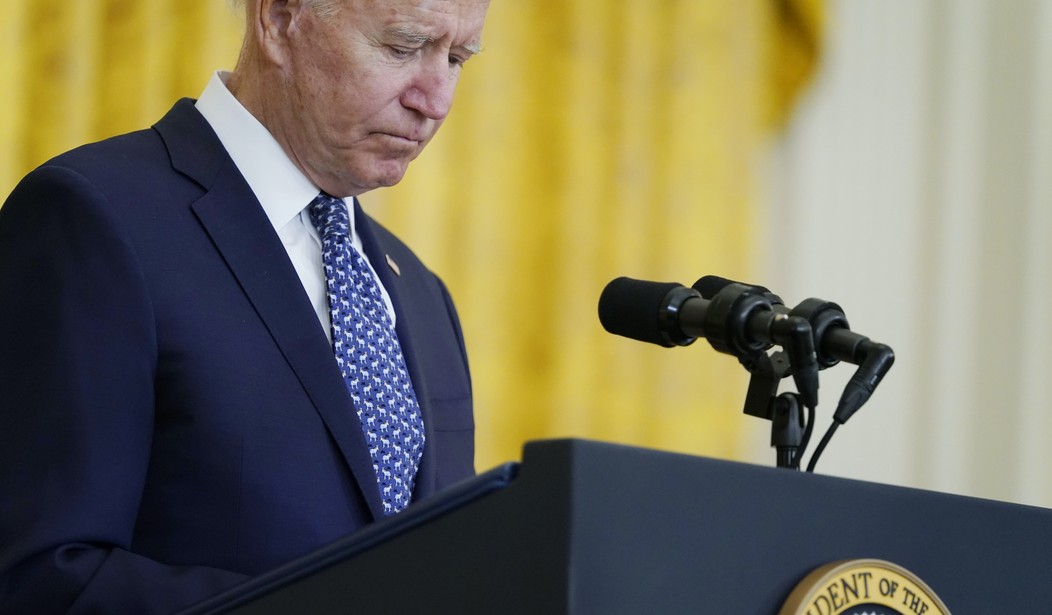The Pentagon’s admission late this week that its drone strike in Afghanistan on August 29 killed at least ten civilians, including seven children, rather than terrorists affiliated with ISIS-K, as it previously claimed, represents not just a “horrible mistake,” in the words of President Biden’s defense secretary Lloyd Austin. Rather, it stands as the latest fiasco in Biden’s botched exit from that country over the last month, and, in the best traditions of our military, it demands accountability right at the top of our defense department. Whether Biden holds his senior team accountable is up to him, but his decision represents arguably the most serious test of his presidency to date, and will have a profound impact on his party’s political fortunes either way.
The drone strike in question came three days after thirteen U.S. service members were killed by a suicide bomber as they provided security at the international airport in Kabul, and Secretary Austin underscored that the strike was “conducted to prevent what was believed to be [another] imminent threat” to the Kabul airport, and came under intense pressure from Biden, who vowed publicly two days beforehand to “hunt down” the terrorists who killed our forces at the airport and “make [them] pay.” General Mark Milley, the chairman of the Joint Chiefs of Staff, acknowledged the stakes at the time of the strike, noting Friday, “[i]n a dynamic high threat environment, the commanders on the ground had appropriate authority and had reasonable certainty that the target was valid.”
Whatever the pressure under which it was conducted, the tragic strike represents the latest mistake of Biden’s hastily executed withdrawal from Afghanistan that has been called “one of the sorriest American failures in decades...[whose] consequences will play out for years, if not decades.” Secretary Austin and General Milley were Biden’s two principal advisers on the military withdrawal from the country, and bear ultimate responsibility for the operation, including this strike that took ten innocent lives.
Accountability represents one of the bedrock principles of the U.S. government, particularly in the military, and in recent years presidents of both parties have determined that when things go badly on one of their advisers’ watch, they need to show the American people that there are consequences for that action by asking for their resignation, whether the action results from actual mismanagement or from an honest mistake.
Recommended
Former Defense Secretary Robert Gates had a particularly strong record on recommending accountability actions from both presidents he served, George W. Bush and Barack Obama. In his first two years under Bush, Gates asked for the resignation of the Army and Air Force secretaries for separate scandals that occurred on their watch, and dismissed the Air Force’s top general as well.In the first year of President Obama’s term, Gates dismissed the head of U.S. forces in Afghanistan over our military progress there. One year later, President Obama asked for the resignation of that very general’s replacement when he and his aides made controversial comments about senior administration civilian leaders in a magazine article. President Obama later took decisive action against one of his own cabinet members when he accepted the resignation of Veterans Affairs Secretary Eric Shinseki, after a wait-times scandal emerged at the department’s medical centers in 2014.
Conversely, when presidents fail to hold their senior leaders accountable for deeply unpopular actions on their watch, they often pay a steep political price. Fifteen years ago, at the height of the public disapproval of the Iraq war in 2006, President Bush decided against firing his defense secretary Donald Rumsfeld, whose leadership had become a metaphor for missteps in that conflict.In that year’s midterm elections, Republicans lost their majorities in both the House and Senate and both parties attributed the change to the failure to remove Rumsfeld before the election. Bush did fire Rumsfeld the day after the election, to consternation from Republican congressional leaders. Pennsylvania Republican Senator Arlen Specter summed up the political consequences of the delay in accountability to CNN: “And if Rumsfeld had been out, you bet it would have made a difference. I’d still be chairman of the Judiciary Committee.”
The recent U.S. drone strike in Afghanistan that killed 10 civilians, including seven children, instead of the terrorists it was targeting, represents the latest of several serious failures by our military leadership in Biden’s mismanaged exit from that country. Even more tragic was the loss of 13 of our brave servicemen and women as part of that mission. Whether Biden chooses to follow his predecessors’ lead in holding our senior military leaders accountable, in this case asking for the resignations of Secretary Austin, General Milley and the head of U.S. Central Command, Marine Corps General Frank McKenzie, remains his call. But the facts of Biden’s botched exit from Afghanistan are clear to the American people, and recent history shows he will pay a huge political price if he fails to hold his senior team accountable.
John Ullyot was Deputy Assistant to the President for National Security Affairs and NSC Spokesman from 2019-2021.

























Join the conversation as a VIP Member